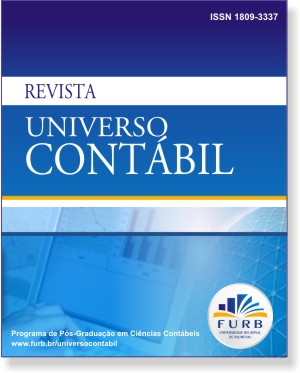TO BE OR NOT TO BE INDEPENDENT? AN EXPLORATORY STUDY ON THE INDEPENDENCE OF SUPREME AUDIT INSTITUTIONS AND THE LEVEL OF COUNTRIES’ FISCAL TRANSPARENCY
DOI:
https://doi.org/10.4270/ruc.20128Keywords:
Supreme Audit Institution. Independence. Fiscal transparency.Abstract
The aim of this study was to identify the existence of a relationship between the level of independence of a Supreme Audit Institution and the level of fiscal transparency of a country. The independence of an audit institution is seen as an essential factor that can affect the performance of activities of this entity, since it is related to the credibility that is assigned to this institution. Considering the objective of this research, there was performed an analysis hierarchical cluster using the clustering algorithm for greater distance and similarity measure of square Euclidean distance. The sample used was composed of data from 85 countries, including Brazil. The initial solution resulted in eleven clusters. After reclassification, those were reorganized into six new groups. The analysis led to the finding that a level of independence of a national audit is associated with a regular or good level of fiscal transparency of a country. The contrary assertion was also observed, i.e., low levels of independence of a Supreme Audit Institution are associated with low levels of fiscal transparency of the country. Another finding is that, besides the level of fiscal transparency, other variables affect the level of independence. The main limitation of this study was the use of variables related to the independence of a Supreme Audit Institution, given that there were evidences that other variables can impact the adoption of practices related to fiscal transparency.
Downloads
References
ARAGÓN, A. G. de Case study: societal perceptions of the Superior Audit Office of Mexico. International Journal of Government Auditing, v. 36, n. 2, p. 15-17, abr. 2009.
BLUME, L.; VOIGT, S. Supreme audit institutions: supremely superfluous? A cross country assessment. ICER Working Paper, v. 3, p. 1-30, mar. 2007.
BRASIL. Constituição da República Federativa do Brasil de 1988. Diário Oficial da União. Brasília: DF. Disponível em: <http://www.planalto.gov.br/ccivil_03/Constituicao/_Constitui çaoCompilado.htm>. Acesso em: 15 mar. 2010.
CLARK, C.; MARTINIS, M.; KRAMBIA-KAPARDIS, M. Audit quality attributes of European Union supreme audit institutions. European Business Review, v. 19, n. 1, p. 40-71, 2007. http://dx.doi.org/10.1108/09555340710714144
DYE, K. M.; STAPENHURST, R. Pillars of integrity: the importance of supreme audit institutions in curbing corruption. Washington: The Economic Development Institute of the World Bank, 1998.
FUNDO MONETÁRIO INTERNACIONAL. Código de boas práticas para a transparência nas políticas monetária e financeira: declaração de princípios. 1999. Disponível em: <http://www.imf.org/external/np/mae/mft/code/por/code2p.pdf>. Acesso em: 10 de mar. 2010.
FUNDO MONETÁRIO INTERNACIONAL. Manual revisto de transparência fiscal. 2001. Disponível em: <http://www.imf.org/external/np/fad/trans/por/manualp.pdf>. Acesso em: 15 jun. 2008.
INTERNATIONAL BUDGET PARTNERSHIP. About the Open Budget Initiative. Disponível em: <http://www.openbudgetindex.org/index.cfm?fa=about>. Acesso em: 15 jan. 2010.
GOOLSARRAN, S. A. The evolving role of supreme audit institutions. Journal of Government Financial Management, v. 56, n. 3, p. 28–32, 2007. http://dx.doi.org/10.1007/s10669-004-4800-2
INTOSAI. Declaração de Lima sobre Diretrizes para Preceitos de Auditoria. 1977. Disponível em: <http://portal2.tcu.gov.br/portal/page/portal/TCU/relacoes_institucionais/relacoes_interna cionais/organizacoes_internacionais/DECLARAÇÃO_DE_LIMA_PORT_0.pdf>. Acesso em: 05 jan. 2010.
KOPITS, G.; CRAIG, J. Transparency in government operations. IMF – Occasional Paper, v. 158, p. 1-42, jan. 1998.
LEEUWEN, S. V. Auditing international environmental agreements: the role of supreme audit institutions. The Environmentalist, v. 24, p. 93-99, 2004.
MAROCO, J. Análise estatística – com utilização do SPSS. 3. ed. Lisboa: Edições Sílabo, 2007.
MORIN, D. Welcome to the court. European Group of Public Administration, Madrid, Spain, p. 1-26, set. 2007.
NIKODEM, A. Constitutional regulation of supreme audit institutions in Central Europe in a comparative perspective. Managerial Law, v. 46, n. 6, p. 32-52, 2004. http://dx.doi.org/10.1108/03090550410771044
OCDE. OECD best practices for budget transparency. 2002. Disponível em: . Acesso em: 02 fev. 2010.
PIOVESAN, A.; TEMPORINI, E. R. Pesquisa exploratória: procedimento metodológico para o estudo de fatores humanos no campo da saúde pública. Revista Saúde Pública, v. 29, n. 4, p. 318-325, 1995. http://dx.doi.org/10.1590/S0034-89101995000400010
PREMCHAND, A. Fiscal transparency and accountability: idea and reality. In: UNITED NATIONS. Globalization and new challenges of public finance: financial management, transparency and accountability. New York: United Nations, 2002. p. 129-143
SANDBERG, B.; LARSSON, K. The role of auditing in performance improvement in Sweden. In: OECD. Performance auditing and the modernisation of government. Paris: Puma, 1996. p. 195-198
SANTISO, C. Improving fiscal governance and curbing corruption: how relevant are autonomous audit agencies? International Public Management Review, v. 7, n. 2, p. 97-108, 2006.
SUZUKI, Y. Basic structure of government auditing by a supreme audit institution. Government Auditing Review, v. 11, p. 39-53, mar. 2004.
WORLD BANK. Supporting and Strengthening Supreme Audit Institutions: A World Bank Strategy. 7 out. 2004. Disponível em: <http://siteresources.worldbank.org/EXTFINAN CIALMGMT/Resources/313217-1196225463975/4440996-1196226228826/WB-Strategy-Su pport-Strength-SAIs.pdf>. Acesso em: 15 mar. 2010.
ZYL, A. V.; VIVEK, R.; RENZIO, P. Responding to challenges of supreme audit institutions: Can legislatures and civil society help? Bergen: Chr. Michelsen Institute, 2009.
Published
How to Cite
Issue
Section
License
The copyright for papers published in this journal belong to the author, with rights of first publication for the journal. As the papers appears in this publicly accessed journal, the papers are for free use, receiving their credit, in educational and non-commercial uses. The journal will allow the use of the papers published for non-commercial purposes, including the right to send the paper to publicly accessed databases.


